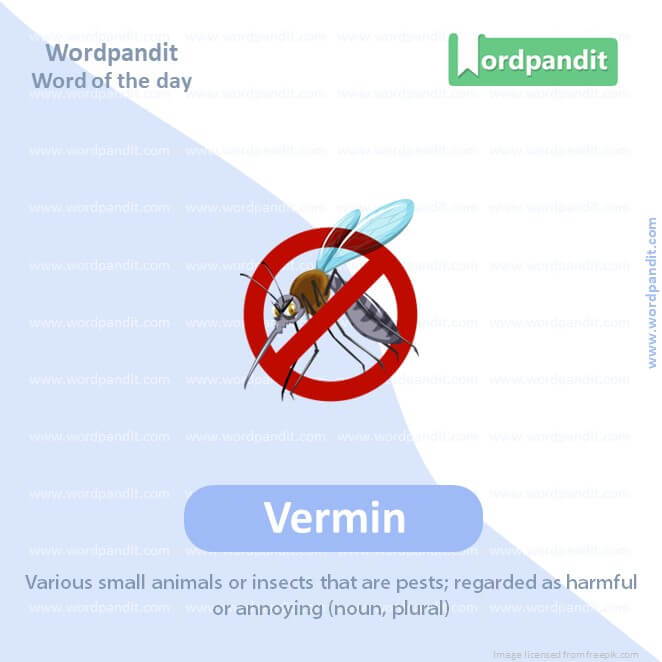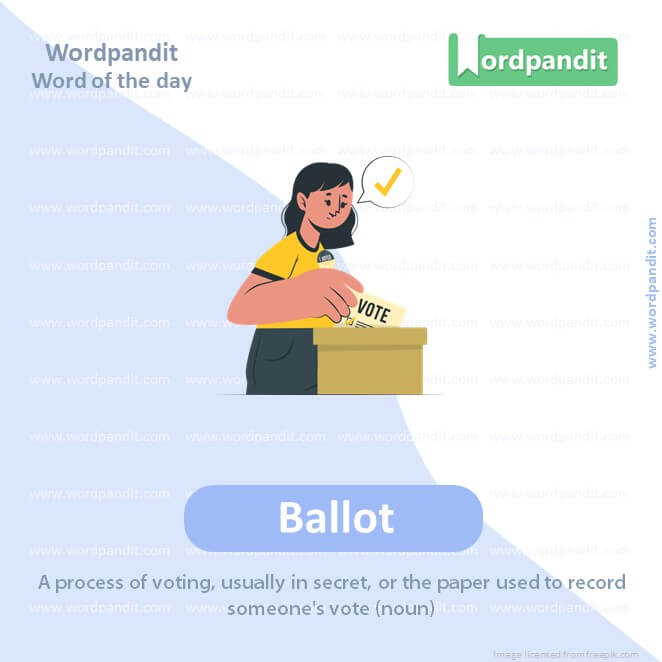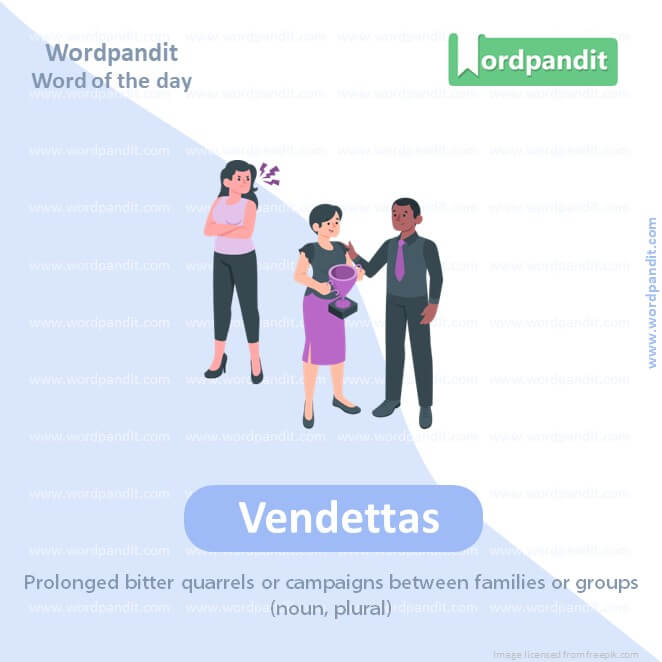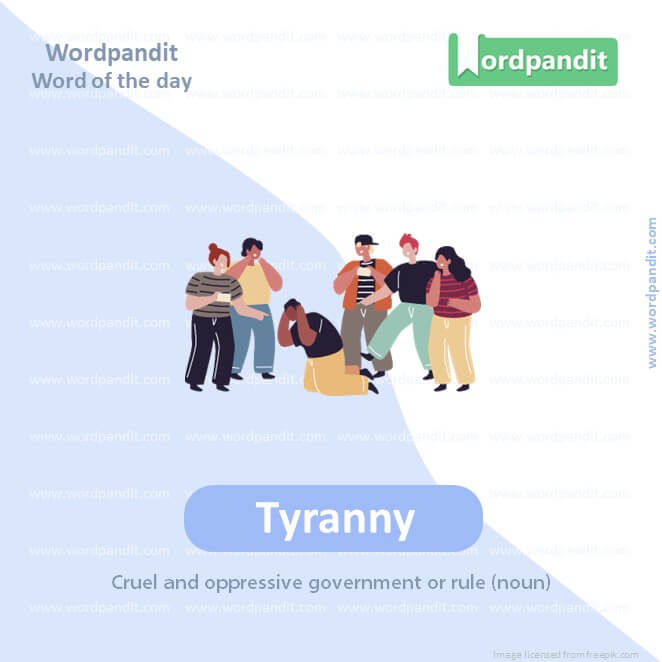Daily Vocabulary Words: List of Daily Used Words in Leading International Newspapers
Hi there. Welcome to this special section @ Wordpandit.
Our endeavour here is very simple: to highlight important daily vocabulary words, which you would come across in leading newspapers in the country. We have included the following newspapers in our selection:
• The New York Times
• The Washington Post
• Scientific American
• BBC
• The Guardian
• Psychology Today
• Wall Street Journal
• The Economist
We are putting in extensive work for developing your vocabulary. All you have got to do is be regular with this section and check out this post on a daily basis. This is your repository of words that are commonly used and essentially, we are posting a list of daily used words. Hence, this has significant practical application as it teaches you words that are used commonly in leading publications mentioned above.
Visit the website daily to learn words from leading international newspapers.

WORD-1: Vermin
CONTEXT: That delusion is no longer available. When Trump promises to expunge the “radical left thugs that live like vermin within the confines of our country”, it is a safe bet that he intends to follow through. If returned to the White House he would use every executive lever to eliminate restraint on his power.
SOURCE: The Guardian
EXPLANATORY PARAGRAPH: Vermin are small animals or insects that are not liked because they can be harmful or cause damage, like rats or bugs that might eat food in a kitchen.
MEANING: Various small animals or insects that are pests; regarded as harmful or annoying (noun, plural).
PRONUNCIATION: ver-min
SYNONYMS: Pests, Rodents, Bugs, Parasites, Insects
USAGE EXAMPLES:
1. The old house was infested with vermin.
2. Farmers often try to protect their crops from vermin.
3. Cats are known for catching vermin like mice.
4. Special measures were taken to control the vermin.

WORD-2: Eliminate
CONTEXT: That delusion is no longer available. When Trump promises to expunge the “radical left thugs that live like vermin within the confines of our country”, it is a safe bet that he intends to follow through. If returned to the White House he would use every executive lever to eliminate restraint on his power.
SOURCE: The Guardian
EXPLANATORY PARAGRAPH: Eliminate is like erasing something completely or taking it away. Like when you clean up your room and throw away the trash, you eliminate the mess.
MEANING: Completely remove or get rid of (something) (verb).
PRONUNCIATION: ih-lim-uh-nayt
SYNONYMS: Remove, Eradicate, Dispose, Get rid of, Exterminate
USAGE EXAMPLES:
1. The new policy aims to eliminate corruption.
2. She was eliminated from the competition.
3. Efforts were made to eliminate the disease.
4. He tried to eliminate distractions while studying.
WORD-3: Restraint
CONTEXT: That delusion is no longer available. When Trump promises to expunge the “radical left thugs that live like vermin within the confines of our country”, it is a safe bet that he intends to follow through. If returned to the White House he would use every executive lever to eliminate restraint on his power.
SOURCE: The Guardian
EXPLANATORY PARAGRAPH: Restraint is like holding back or controlling something. Like when you really want to eat another cookie, but you stop yourself, that’s showing restraint.
MEANING: Holding back or limiting something or someone’s actions (noun).
PRONUNCIATION: re-straynt
SYNONYMS: Control, Constraint, Moderation, Limitation, Discipline
USAGE EXAMPLES:
1. He showed great restraint in not responding to the insult.
2. The dog was kept under restraint.
3. Financial restraint is important for budgeting.
4. The law imposes certain restraints on the company.

WORD-4: Ballot
CONTEXT: That is why he is facing multiple criminal charges and has been disbarred from even appearing on the ballot in two states (although the ban could be overturned by the supreme court).
SOURCE: The Guardian
EXPLANATORY PARAGRAPH: A ballot is a piece of paper you use to vote. When there’s a decision to make, like choosing a class president, you write your choice on a ballot.
MEANING: A process of voting, usually in secret, or the paper used to record someone’s vote (noun).
PRONUNCIATION: bal-ut
SYNONYMS: Vote, Voting slip, Poll, Ticket, Election paper
USAGE EXAMPLES:
1. Everyone cast their vote on the ballot.
2. The winner was decided by a secret ballot.
3. The ballot box was sealed after voting.
4. A new measure was added to the ballot.

WORD-5: Vendettas
CONTEXT: He would requisition the justice system to entrench his position and pursue vendettas against all who crossed him. He would find no shortage of appeasers and accomplices.
SOURCE: The Guardian
EXPLANATORY PARAGRAPH: Vendettas are long and angry fights between people or groups, often lasting for a very long time. It’s like when families or friends stay mad at each other for years.
MEANING: Prolonged bitter quarrels or campaigns between families or groups (noun, plural).
PRONUNCIATION: ven-det-tas
SYNONYMS: Feuds, Grudges, Disputes, Rivalries, Conflicts
USAGE EXAMPLES:
1. The two families had a vendetta going back generations.
2. His actions were motivated by an old vendetta.
3. The political vendettas divided the community.
4. They resolved to end their vendettas and reconcile.

WORD-6: Tyranny
CONTEXT: This is how tyranny makes itself electable: it is branded as the avenging arm of freedom.
SOURCE: The Guardian
EXPLANATORY PARAGRAPH: Tyranny is when a leader or ruler is very mean and unfair, making people do things they don’t want to do, and not letting anyone disagree with them.
MEANING: Cruel and oppressive government or rule (noun).
PRONUNCIATION: tir-uh-nee
SYNONYMS: Dictatorship, Oppression, Despotism, Autocracy, Domination
USAGE EXAMPLES:
1. The people rebelled against the king’s tyranny.
2. The tyranny of the regime was unbearable.
3. He spoke out against the tyranny of the government.
4. Many fled the country to escape its tyranny.
WORD-7: Stirring
CONTEXT: But Sunak indulges the Trumpian side of British conservatism, partly from fear of stirring division in his party, but also in the patronising pursuit of some notion of earthy authenticity, a “common touch”, which the prime minister understands only as a campaign quality he conspicuously lacks.
SOURCE: The Guardian
EXPLANATORY PARAGRAPH: Stirring means causing excitement or strong feelings. Like when you hear a story about a hero saving the day, and it makes you feel brave and happy.
MEANING: Causing excitement or strong emotion; rousing (adjective).
PRONUNCIATION: stur-ring
SYNONYMS: Exciting, Inspirational, Moving, Stimulating, Provoking
USAGE EXAMPLES:
1. The speech was a stirring call to action.
2. She felt a stirring sense of pride.
3. The music was stirring and beautiful.
4. It was a stirring moment when the team won.
WORD-8: Conspicuously
CONTEXT: But Sunak indulges the Trumpian side of British conservatism, partly from fear of stirring division in his party, but also in the patronising pursuit of some notion of earthy authenticity, a “common touch”, which the prime minister understands only as a campaign quality he conspicuously lacks.
SOURCE: The Guardian
EXPLANATORY PARAGRAPH: Conspicuously means being very easy to see or notice, like wearing a bright red hat in a crowd of people all wearing black.
MEANING: In a clearly visible or attracting attention way; obviously (adverb).
PRONUNCIATION: kun-spi-kyoo-us-lee
SYNONYMS: Noticeably, Obviously, Prominently, Clearly, Evidently
USAGE EXAMPLES:
1. The trophy sat conspicuously on the shelf.
2. He was conspicuously absent from the meeting.
3. Her talent was conspicuously superior.
4. The mistake was conspicuously present in the report.
WORD-9: Keenest
CONTEXT: The Tories’ most demagogic streak will soon be on display in debates over the Rwanda safety bill, and not just because the MPs who are keenest to dispatch asylum claimants to Kigali also take mischievous pleasure in affronting liberal sensibilities over immigration.
SOURCE: The Guardian
EXPLANATORY PARAGRAPH: Keenest means being the most excited or interested in something. Like when you’re the most eager to play a new game out of all your friends.
MEANING: Having or showing eagerness or enthusiasm to the highest degree (adjective, superlative).
PRONUNCIATION: keen-est
SYNONYMS: Most eager, Most enthusiastic, Most intense, Most acute, Most fervent
USAGE EXAMPLES:
1. She was the keenest participant in the workshop.
2. His keenest interest was in history.
3. Among the candidates, he was the keenest.
4. She showed the keenest mind in solving the puzzle.
WORD-10: Affronting
CONTEXT: The Tories’ most demagogic streak will soon be on display in debates over the Rwanda safety bill, and not just because the MPs who are keenest to dispatch asylum claimants to Kigali also take mischievous pleasure in affronting liberal sensibilities over immigration.
SOURCE: The Guardian
EXPLANATORY PARAGRAPH: Affronting is like being really rude or offensive to someone. It’s when you say or do something that upsets or disrespects someone else.
MEANING: Openly insulting or showing disrespect towards someone (adjective).
PRONUNCIATION: uh-frun-ting
SYNONYMS: Insulting, Disrespectful, Offensive, Disparaging, Rude
USAGE EXAMPLES:
1. His comments were seen as affronting to the community.
2. She found his behavior deeply affronting.
3. The affronting gesture caused an uproar.
4. The article was affronting to many readers.
Vocabulary Spelling
In the rich tapestry of language learning, getting the ‘vocabulary spelling’ right forms a significant thread. These spelled words or the arrangement of letters give each word its unique identity. However, understanding ‘vocabulary spelling’ proficiently needs an insightful and strategic approach.
Starting the journey of learning ‘vocabulary spelling’, one must focus on observing patterns. English language words often follow certain spelling rules or patterns. Recognizing these can simplify the learning process, offering a systematic way to appreciate ‘vocabulary spelling’.
The trick to ingraining ‘vocabulary spelling’ effectively lies in the power of repetition. Regularly writing words can help reinforce the spelling in your memory. To boost this, tools like spelling quizzes or flashcards with the word on one side and the spelling on the other can provide an engaging way to practice ‘vocabulary spelling’.
An unconventional yet powerful approach to remember ‘vocabulary spelling’ is by using mnemonic devices. For instance, connecting the word’s spelling with a catchy phrase or rhyming pattern can make recall easier.
Integrating technology with learning ‘vocabulary spelling’ has its unique benefits, too. Apps offer various exercises and tests that not only enhance memory but also make learning fun.
Importantly, the learning of ‘vocabulary spelling’ should be punctuated with regular revisions. This ensures the recalled spelling is correct and cements it in your long-term memory.
In a nutshell, mastering ‘vocabulary spelling’ requires keen observation, regular practice, innovative mnemonic tools, use of technology, and timely revisions. As you follow this comprehensive path, you strengthen your grasp over ‘vocabulary spelling’, paving the way to language proficiency. Remember, every word spelled correctly is a moment of triumph in the enthralling escapade of language learning!











